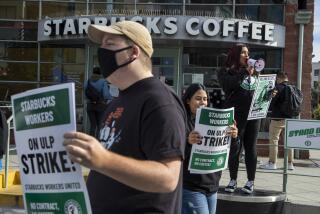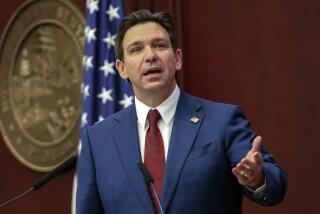Supreme Court rules for Christian cake baker but voices support for gay rights too
Reporting from Washington — The Supreme Court upheld both gay rights and religious freedom Monday with a narrowly written decision in favor of a Christian baker who refused to make a wedding cake for a same-sex couple.
By a 7-2 vote, the court said Jack Phillips, the Colorado baker, was treated with hostility and bias by a state commission that concluded his actions violated a state anti-discrimination law. One commission member had commented that religion was used throughout history to justify slavery, the Holocaust and “all kinds of discrimination.”
But the court’s opinion also emphasized the importance of equal rights for gays and lesbians, and it largely rejected the claim that store owners have broad religious liberty rights to turn away customers because of their sexual orientation.
Although some may object to same-sex marriages, said Justice Anthony M. Kennedy, “it is a general rule that such objections do not allow business owners and other actors in the economy and in society to deny protected persons equal access to goods and services under a neutral and generally applicable public accommodations law.”
Decision time: Supreme Court tackles cases on gay rights, gerrymandering, unions »
The outcome was not a clear win for either side in what has become one of the nation’s latest culture wars.
Kennedy and the majority chose the narrowest possible way to resolve the case of Masterpiece Cakeshop vs. Colorado Civil Rights Commission.
Lawyers for Phillips had argued that forcing him to make a wedding cake for a same-sex couple violated his rights to free speech and the free exercise of religion.
Instead, the court ruling focused on how Phillips was treated unfairly by the Colorado Civil Rights Commission, and for this reason alone, he won his case.
“The commission’s hostility [to Phillips and his religious beliefs] was inconsistent with the First Amendment’s guarantee that our laws be applied in a manner that is neutral toward religion,” Kennedy wrote. “Phillips was entitled to a neutral decision-maker who would give full and fair consideration to his religious objection.”
Kennedy said the ruling was limited to the dispute between Phillips and the Colorado commission, raising doubts about whether it would help other store owners who voiced the same claim based on their “sincerely held religious beliefs.”
“The outcome of other cases like this in other circumstances must await further elaboration in the courts,” said Kennedy, who has authored most of the court’s most significant gay rights cases. “These disputes must be resolved with tolerance, without undue disrespect to sincere religious belief, and without subjecting gay persons to indignities when they seek goods and services in an open market.”
Chief Justice John G. Roberts Jr. and conservative Justices Samuel A. Alito Jr. and Neil M. Gorsuch joined Kennedy’s opinion, as did liberal Justices Elena Kagan and Stephen G. Breyer.
Conservative Justice Clarence Thomas agreed with the outcome but did not sign on to Kennedy’s opinion and its endorsement of equal rights for gays and lesbians.
Justices Ruth Bader Ginsburg and Sonia Sotomayor dissented, but only because they did not believe the “comments of one or two commissioners” suggested the state was biased against Phillips because of his religious beliefs.
The case has been widely seen as a clash between Christian conservatives and champions of gay rights in states like Colorado and California. Twenty-two states have laws that forbid businesses from discriminating based on sexual orientation and require “full and equal” service for gay and lesbian customers. Federal law forbids discrimination based on race, religion and national origin, but not sexual orientation.
The Colorado case arose as part of a conservative backlash against the Supreme Court’s 2015 ruling, also written by Kennedy, holding that same-sex couples had a constitutional right to marry in all states. The Arizona-based Alliance Defending Freedom had gone to court in several states seeking religious exemptions for Christian conservatives like Phillips who believed it would be sinful to help celebrate a same-sex marriage. Phillips said he would gladly serve gay customers, but he refused to design a custom wedding cake for a same-sex couple.
In 2012, Charlie Craig and David Mullins went to Phillip’s bake shop in a strip mall in Lakewood, Colo., based on the recommendation of a wedding planner. They had married in Massachusetts but returned to the Denver area for a celebratory reception with their family and friends.
But the celebration hit a sour note. As soon as they said they were interested in a wedding cake, Phillips told them he did not create cakes for same-sex couples. Angry and upset, they left the store and later filed a complaint with the state’s Civil Rights Commission. This seven-member panel is charged with enforcing the state’s law. It does not impose fines or award damages, but it can order businesses to “cease and desist” from discriminating.
An administrative judge heard from Phillips and the two men, and ruled the store was violating the law. The commission agreed unanimously, and the Colorado courts rejected appeals from Phillips. The Supreme Court, however, agreed to hear his case.
Nearly all of the arguments had focused on the claim that the baker, if required to make a custom cake, would in effect be forced to express a viewpoint in favor of same-sex marriage against his religious beliefs. He also claimed that his cakes were a form of protected artistic expression.
The Trump administration urged the court to rule that Phillips had a free-speech right not to make a special cake to celebrate a same-sex marriage.
But Kennedy dismissed this argument. “Few persons who have seen a beautiful wedding cake might have thought of its creation as an exercise in protected speech,” he said. Moreover, it was unclear whether the two men were seeking a cake with a special message or simply a standard product.
Kennedy turned next to the free exercise of religion. In 1990, shortly after Kennedy joined the court, the justices said individuals do not have a right to religious exemption from ordinary laws. But a few years later in a case involving the Santeria religion and ritual sacrifice of animals, the court said the government may not pass special laws or discriminate against people because of their religious views. The author of that 1993 opinion was Kennedy.
Monday’s decision focused heavily on the comments of one commissioner who described religious rhetoric as “despicable” and said some people “use their religion to hurt others.”
Such comments had been hardly mentioned as the case moved through the courts. But Kennedy cited them during the oral argument in December.
Advocates for both religious liberty and gay rights saw something to like in the decision.
“The court has said 7-2 that the Constitution requires us to try and get along. There is room enough in our society for a diversity of viewpoints and that includes respecting religious beliefs too,” said Mark Rienzi, president of the Becket Fund for Religious Liberty. He called the decision a “strong message to governments across the country that they must respect — rather than punish — religious diversity on important issues.”
Shannon Minter, legal director for the National Center for Lesbian Rights, said the narrow ruling “leaves intact the long-standing principle that states can require businesses open to the public to serve everyone, even when some businesses believe that doing so violates their religious beliefs.”
“Anti-LGBTQ extremists did not win the sweeping ‘license to discriminate’ they have been hoping for,” said Chad Griffin, president of the Human Rights Campaign. Instead, the court “acknowledged that LGBTQ people are equal and have a right to live free from the indignity of discrimination.”
On Twitter: DavidGSavage
UPDATES:
4:05 p.m.: This story was updated with additional reaction and details from the decision.
8:35 a.m.: This story was updated with additional details from the ruling.
This story was originally published at 7:50 a.m.
More to Read
Get the L.A. Times Politics newsletter
Deeply reported insights into legislation, politics and policy from Sacramento, Washington and beyond. In your inbox three times per week.
You may occasionally receive promotional content from the Los Angeles Times.











